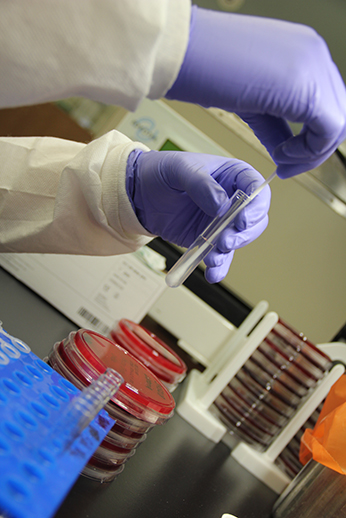
| Feb. 2016 | |||||||||||
| Top stories | |||||||||||
| In the news | |||||||||||
| Photos | |||||||||||
| Contact us | |||||||||||
| Archive | |||||||||||
|
Listeria monocytogenes found in blue cheese |
Maytag Dairy Farms in Newton announced on Feb. 18 a voluntary recall of Maytag Raw Milk Blue Cheese (lot number 150482) due to possible contamination with Listeria monocytogenes. This follows the recall of lot number 150481 that was announced Feb. 13.
 A clinical lab analyst makes a cell suspension as part of Listeria testing.
A clinical lab analyst makes a cell suspension as part of Listeria testing.Lot 150482 includes approximately 1,100 pounds of cheese, some of which had been distributed to retail locations prior to the initial recall by Maytag Dairy Farms. No cheese has been distributed since the initial positive test for Listeria monocytogenes. Lot number 15081 included 896 pounds of cheese.
Consumers who have purchased these products are urged to not consume them.
The State Hygienic Laboratory performed some of this testing for Listeria monocytogenes and worked closely with the Iowa Department of Agriculture and Land Stewardship (IDAL), Iowa Department of Inspections and Appeals, Iowa Department of Public Health, and the U. S. Food and Drug Administration.
The Hygienic Laboratory performed real time polymerase chain reaction testing, culture confirmation and final Listeria monocytogenes identification by MALDI-TOF mass spectrometry. DNA fingerprinting was performed on the Listeria monocytogenes isolates and patterns uploaded to PulseNet, a CDC international molecular subtyping network, to help identify local and multi-state foodborne outbreaks.
IDALS’ Dairy Products Control Bureau discovered the possible contamination as part of a follow-up test of cheese products from the facility. As of Feb. 18, there have been no reported illnesses linked to the product.
To arrange for a refund and return of the product, consumers may contact Maytag Dairy Farms at 800-247-2458 or 641-791-2010.
Listeria monocytogenes is a pathogen found in the environment. Newborns, pregnant women, elderly and those who are immunocompromised are especially susceptible if they eat product contaminated with this bacterium. More information is on the Centers for Disease Control website.